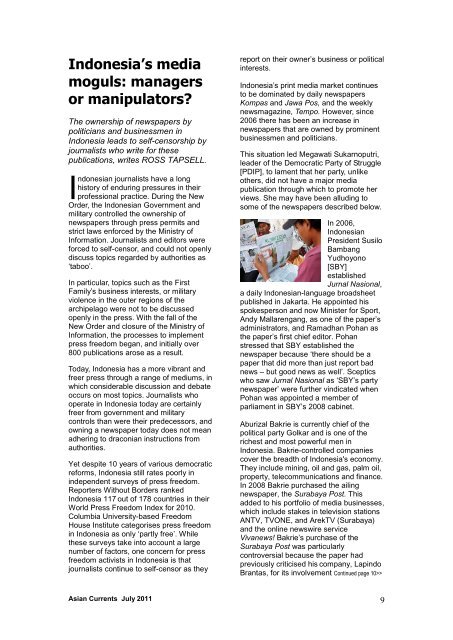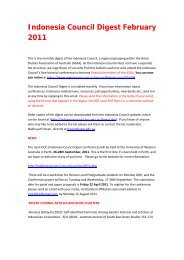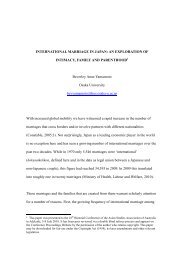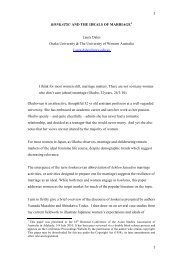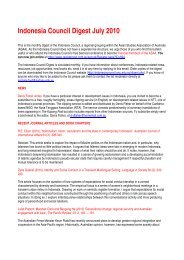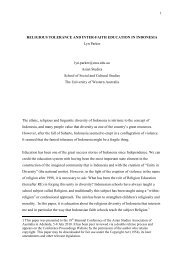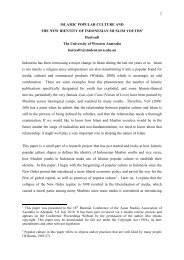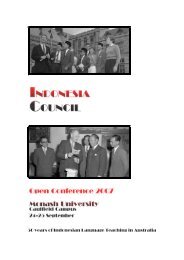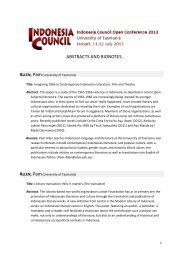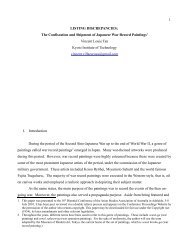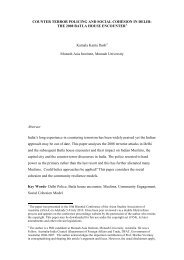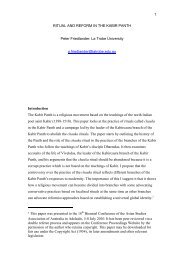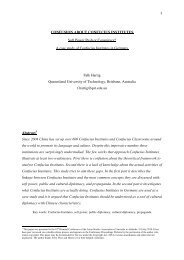Asian Currents - Asian Studies Association of Australia
Asian Currents - Asian Studies Association of Australia
Asian Currents - Asian Studies Association of Australia
You also want an ePaper? Increase the reach of your titles
YUMPU automatically turns print PDFs into web optimized ePapers that Google loves.
Indonesia’s media<br />
moguls: managers<br />
or manipulators<br />
The ownership <strong>of</strong> newspapers by<br />
politicians and businessmen in<br />
Indonesia leads to self-censorship by<br />
journalists who write for these<br />
publications, writes ROSS TAPSELL.<br />
I<br />
ndonesian journalists have a long<br />
history <strong>of</strong> enduring pressures in their<br />
pr<strong>of</strong>essional practice. During the New<br />
Order, the Indonesian Government and<br />
military controlled the ownership <strong>of</strong><br />
newspapers through press permits and<br />
strict laws enforced by the Ministry <strong>of</strong><br />
Information. Journalists and editors were<br />
forced to self-censor, and could not openly<br />
discuss topics regarded by authorities as<br />
‗taboo‘.<br />
In particular, topics such as the First<br />
Family‘s business interests, or military<br />
violence in the outer regions <strong>of</strong> the<br />
archipelago were not to be discussed<br />
openly in the press. With the fall <strong>of</strong> the<br />
New Order and closure <strong>of</strong> the Ministry <strong>of</strong><br />
Information, the processes to implement<br />
press freedom began, and initially over<br />
800 publications arose as a result.<br />
Today, Indonesia has a more vibrant and<br />
freer press through a range <strong>of</strong> mediums, in<br />
which considerable discussion and debate<br />
occurs on most topics. Journalists who<br />
operate in Indonesia today are certainly<br />
freer from government and military<br />
controls than were their predecessors, and<br />
owning a newspaper today does not mean<br />
adhering to draconian instructions from<br />
authorities.<br />
Yet despite 10 years <strong>of</strong> various democratic<br />
reforms, Indonesia still rates poorly in<br />
independent surveys <strong>of</strong> press freedom.<br />
Reporters Without Borders ranked<br />
Indonesia 117 out <strong>of</strong> 178 countries in their<br />
World Press Freedom Index for 2010.<br />
Columbia University-based Freedom<br />
House Institute categorises press freedom<br />
in Indonesia as only ‗partly free‘. While<br />
these surveys take into account a large<br />
number <strong>of</strong> factors, one concern for press<br />
freedom activists in Indonesia is that<br />
journalists continue to self-censor as they<br />
report on their owner‘s business or political<br />
interests.<br />
Indonesia‘s print media market continues<br />
to be dominated by daily newspapers<br />
Kompas and Jawa Pos, and the weekly<br />
newsmagazine, Tempo. However, since<br />
2006 there has been an increase in<br />
newspapers that are owned by prominent<br />
businessmen and politicians.<br />
This situation led Megawati Sukarnoputri,<br />
leader <strong>of</strong> the Democratic Party <strong>of</strong> Struggle<br />
[PDIP], to lament that her party, unlike<br />
others, did not have a major media<br />
publication through which to promote her<br />
views. She may have been alluding to<br />
some <strong>of</strong> the newspapers described below.<br />
In 2006,<br />
Indonesian<br />
President Susilo<br />
Bambang<br />
Yudhoyono<br />
[SBY]<br />
established<br />
Jurnal Nasional,<br />
a daily Indonesian-language broadsheet<br />
published in Jakarta. He appointed his<br />
spokesperson and now Minister for Sport,<br />
Andy Mallarengang, as one <strong>of</strong> the paper‘s<br />
administrators, and Ramadhan Pohan as<br />
the paper‘s first chief editor. Pohan<br />
stressed that SBY established the<br />
newspaper because ‗there should be a<br />
paper that did more than just report bad<br />
news – but good news as well‘. Sceptics<br />
who saw Jurnal Nasional as ‗SBY‘s party<br />
newspaper‘ were further vindicated when<br />
Pohan was appointed a member <strong>of</strong><br />
parliament in SBY‘s 2008 cabinet.<br />
Aburizal Bakrie is currently chief <strong>of</strong> the<br />
political party Golkar and is one <strong>of</strong> the<br />
richest and most powerful men in<br />
Indonesia. Bakrie-controlled companies<br />
cover the breadth <strong>of</strong> Indonesia's economy.<br />
They include mining, oil and gas, palm oil,<br />
property, telecommunications and finance.<br />
In 2008 Bakrie purchased the ailing<br />
newspaper, the Surabaya Post. This<br />
added to his portfolio <strong>of</strong> media businesses,<br />
which include stakes in television stations<br />
ANTV, TVONE, and ArekTV (Surabaya)<br />
and the online newswire service<br />
Vivanews! Bakrie‘s purchase <strong>of</strong> the<br />
Surabaya Post was particularly<br />
controversial because the paper had<br />
previously criticised his company, Lapindo<br />
Brantas, for its involvement Continued page 10>><br />
<strong>Asian</strong> <strong>Currents</strong> July 2011 9


